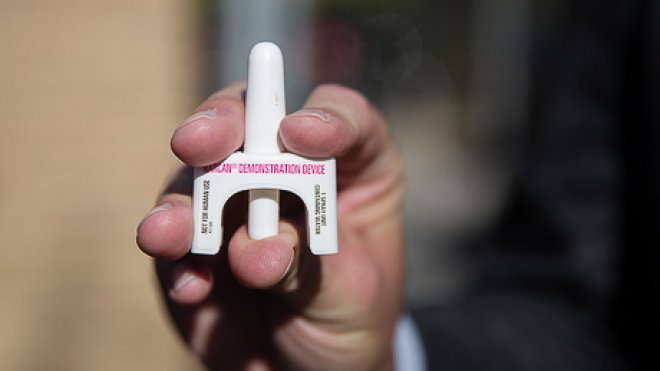RWU to Host Training on Naloxone Intervention for Overdose Prevention
The RWU community will soon have access to a medication that can reverse an opioid overdose. Community members can learn how to use it to save lives, as part of a campuswide effort to combat the opioid epidemic.

BRISTOL, R.I. – On January 22, a group of RWU students, faculty and staff will bring tangible opioid overdose prevention methods to campus in a training on naloxone intervention. Once supplies are available, Naloxone (also known by brand name, NARCAN), a nasal spray that can reverse an overdose before it becomes fatal, will be placed in buildings around campus.
“Wherever there is a defibrillator, there will also be NARCAN,” says Director of Public Safety Steven Melaragno, who currently ensures all EMTs and public safety officers carry the medication. Though Melaragno doesn’t anticipate a huge need, he says it’s important to be prepared, as NARCAN could save a life in the minute it takes for an EMT to arrive onsite.
Roger Williams University is joining a growing number of schools in an effort to combat the opioid epidemic.
Last year, Criminal Justice Professor Sean Varano developed a data system for police to better respond to overdoses. This fall, the RWU School of Justice Studies at the Justice System Training & Research Institute hosted a conference as part of the HOPE (Heroin-Opioid Prevention Effort) initiative. Now, RWU will continue this effort by equipping its community members with tangible prevention methods.
Director of Health Services, Anne Mitchell strongly supports continuing to raise awareness and ability to help people affected by substances. “It is estimated that in the US there is a fatal opioid overdose every 24 minutes,” she said. “This alarming statistic is the reason why it is important for RWU to expand the access of naloxone on campus and provide training to students, staff and faculty on naloxone administration.”
The idea for this training emerged from a combination of in-class and community engagement experiences, initiated by student leadership and the School of Justice Studies faculty.
“I am actively involved in community-based strategies focused on reducing the prevalence of fatal and non-fatal overdoses,” Varano said. “I regularly discuss this issue in just about all of my classes. “
One of his students, RWU criminal justice major and vice president of the John Jay Society, Kayla Elliot, took this knowledge outside the classroom with an internship at EB Hope, an organization in East Bridgewater, Mass., that works to fight the epidemic. There, she was trained to administer naloxone.
When she pitched the idea of getting other John Jay Society members trained in overdose intervention, the RWU administration was enthusiastic. So much so that her and Varano decided to broaden the scope of the training, so the entire campus community could attend.
“With this being such a national concern, those who understand what NARCAN is and how it reverses the effects of an overdose can try to save lives of those struggling with Substance Use Disorder (SUD),” Elliot said. “RWU could be one of many leaders in the fight against SUD and could help educate the surrounding communities on SUD and the opiate epidemic.”
The training will be run by Michelle McKenzie, MPH, of Preventing Overdose and Naloxone Intervention: PONI program by Miriam Hospital. It will be held on January 22 at 3-4 PM in CAS 157. All RWU students, faculty, and staff are welcome to attend.